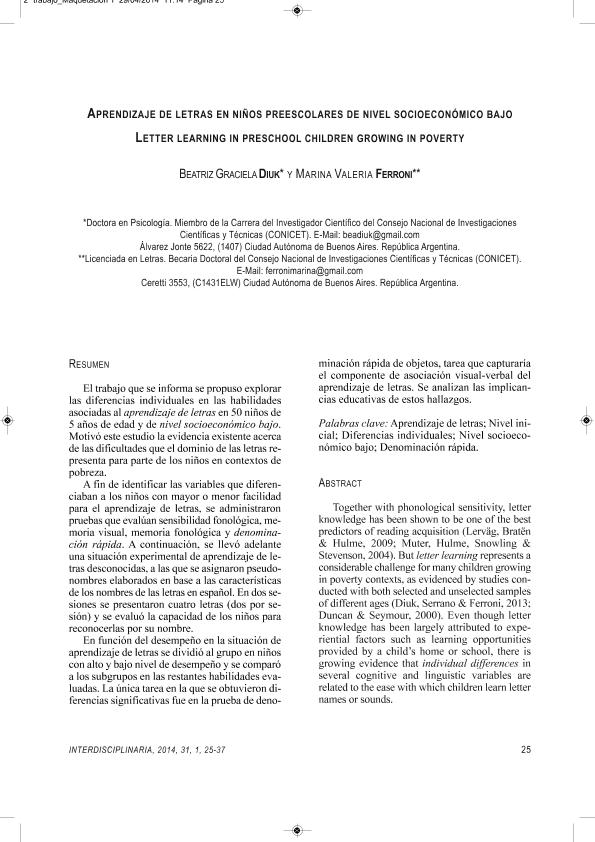Artículo
El trabajo que se informa se propuso explorar las diferencias individuales en las habilidades asociadas al aprendizaje de letras en 50 niños de 5 años de edad y de nivel socioeconómico bajo. Motivó este estudio la evidencia existente acerca de las dificultades que el dominio de las letras representa para parte de los niños en contextos de pobreza. A fin de identificar las variables que diferenciaban a los niños con mayor o menor facilidad para el aprendizaje de letras, se administraron pruebas que evaluaban sensibilidad fonológica, memoria visual, memoria fonológica y denominación rápida. A continuación, se llevó adelante una situación experimental de aprendizaje de letras desconocidas, a las que se asignó pseudonombres elaborados en base a las características de los nombres de las letras en español. En dos sesiones se presentaron cuatro letras (dos por sesión) y se evaluó la capacidad de los niños para reconocerlas por su nombre. En función del desempeño en la situación de aprendizaje de letras se dividió al grupo entre niños con alto y con bajo nivel de desempeño y se comparó a los subgrupos en las restantes habilidades evaluadas. La única tarea en la que se obtuvieron diferencias significativas fue en la prueba de denominación rápida de objetos, tarea que capturaría el componente de asociación visual-verbal del aprendizaje de letras. Se analizan las implicancias educativas de estos hallazgos. Together with phonological sensitivity, letter knowledge has been shown to be one of the best predictors of reading acquisition (Lerväg, Bratën & Hulme, 2009; Muter, Hulme, Snowling & Stevenson, 2004). But letter learning represents a considerable challenge for many children growing in poverty contexts, as evidenced by studies con - duct ed with both selected and unselected samples of different ages (Diuk, Serrano & Ferroni, 2013; Duncan & Seymour, 2000). Even though letter knowledge has been largely attributed to expe - riential factors such as learning opportunities provided by a child’s home or school, there is growing evidence that individual differences in several cognitive and linguistic variables are related to the ease with which children learn letter names or sounds. This paper aimed at exploring letter learning in 50 Argentine, 5-year-old children growing in poverty. Children were tested towards the end of their kindergarten year. An experimental training situation was adapted from Levin, Shatil-Carmon and Asif-Rave (2006). In this situation children were presented with unknown letters (letters from the Cyrillic alphabet). Pseudonames for these letters were created attending to the characteristics of letter names in Spanish. Training involved a card game consisting of a mixed pile of letter cards and picture cards. In each round of the game, the child uncovered one card after the other from the pile and, when a letter card turned up, he or she was asked to provide the letter’s name. Children were presented with four letters, two per session. A point was awarded when the child could accurately name each letter. In order to identify cognitive and linguistic variables which might establish individual differ - ences among children in the ease of acquiring letter names, before the training situation children were given tests evaluating phonological sensitivity (syl - lable and initial sound recognition), phonological memory (digit span and pseudoword repetition), visual memory and rapid naming (RAN) of objects, colors and digits. Based on the scores in the letter learning situ - ation, two subgroups of children were established. The high- and the low-performing subgroups were then compared on the cognitive and linguistic var - ia bles previously examined. No differences between groups were obtained in either phonological sensitivity test, in phonological memory (digit span or pseudoword repetition) or visual memory. Statis - ti cal ly significant differences were only found in the rapid naming of objects (results from the rapid naming of colors and digits tests were excluded from analyses given that a high percentage of the sample could not name all five colors or numbers included in the task). The precise cognitive subs - trate tapped by rapid naming tasks has given rise to considerable debate in the field of Reading Psychology, but there is a growing consensus that these tasks probably capture the efficiency of basic neural mechanisms participating in the establish - ment of visual-verbal associations (Lervåg & Hulme, 2009). In terms of educational implications, rapid naming has proven to be hard to improve (de Jong & Vrielink, 2004). However, abilities strongly associated with RAN, such as reading fluency, can be enhanced through practice, even if rapid naming itself doesn’t improve. RAN performance could consequently be considered an indication of the intensity of the intervention a child will need to achieve learning. Given that many low-income child ren have few opportunities for learning letter names and sounds in their communities, the fact that current kindergarten curricula do not include teaching letters may put many children in the situation of having to acquire alphabet knowledge in a short period of time once they enter 1st grade. Individual differences in rapid naming can thus be expected to play a role in the ease with which children learn in such a demanding context.
Aprendizaje de letras en niños preescolares de nivel socioeconómico bajo
Título:
Letter learning in preschool children growing in poverty
Fecha de publicación:
06/2014
Editorial:
Centro Interamericano de Investigaciones Psicológicas y Ciencias Afines
Revista:
Interdisciplinaria
ISSN:
0325-8203
e-ISSN:
1668-7027
Idioma:
Español
Tipo de recurso:
Artículo publicado
Clasificación temática:
Resumen
Archivos asociados
Licencia
Identificadores
Colecciones
Articulos(SEDE CENTRAL)
Articulos de SEDE CENTRAL
Articulos de SEDE CENTRAL
Citación
Diuk, Beatriz Graciela; Ferroni, Marina Valeria; Aprendizaje de letras en niños preescolares de nivel socioeconómico bajo; Centro Interamericano de Investigaciones Psicológicas y Ciencias Afines; Interdisciplinaria; 31; 1; 6-2014; 25-37
Compartir
Altmétricas




